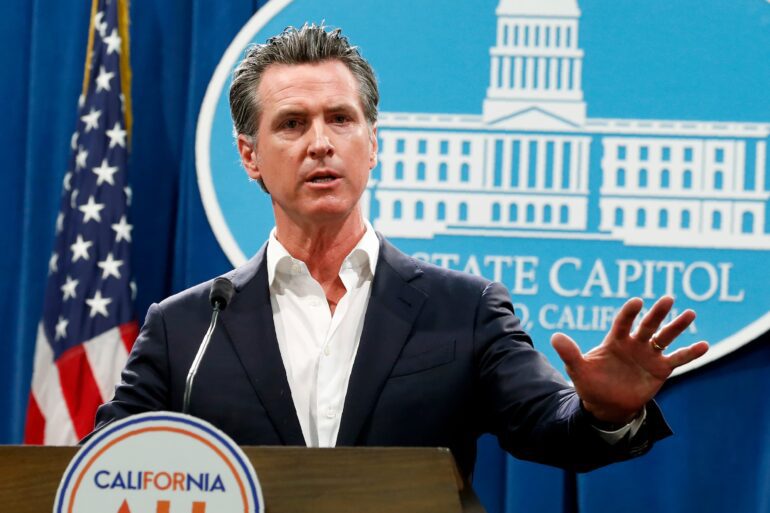TL;DR:
- California lawmakers plan to introduce a dozen bills targeting AI’s potential threats.
- Concerns include job displacement, privacy invasion, election misinformation, safety risks, and biased algorithms.
- California’s proactive stance positions it as a regulatory leader in the absence of federal action.
- Governor Newsom seeks to balance AI innovation and safeguards, impacting tech industry interests.
- Labor unions aim to protect workers in the face of AI adoption.
- The tech industry is open to regulation but wants a role in shaping the rules.
- California’s leadership will have far-reaching implications for AI regulation nationally.
Main AI News:
The fast-paced world of artificial intelligence in Silicon Valley is on a collision course with skepticism, and the battleground is no longer Washington, D.C., but California itself. In the coming year, the Golden State will take center stage as lawmakers in Sacramento prepare to introduce a dozen bills aimed at reining in what is perceived as the most significant threats posed by AI technology. This legislative initiative, as first reported by POLITICO, will address AI’s potential to disrupt employment, invade worker privacy, spread election misinformation, jeopardize public safety, and make biased algorithmic decisions.
California, often at the forefront of regulatory actions in the absence of federal guidelines, finds itself once again in the role of a de facto regulator, akin to its leadership in areas like data privacy, online child safety standards, and vehicle emissions requirements. The impending clash will pit lawmakers seeking to prevent AI technology from spiraling out of control against the formidable tech industry, with the state’s governor, Gavin Newsom, playing a crucial role in shaping the outcome.
“Generative AI is a potentially world-changing technology for unimaginable benefit, but also incalculable cost and harm,” warns Jason Elliott, Newsom’s AI advisor. The uncertain trajectory of this technology underscores the need for cautious regulation. Already, California lawmakers have laid the groundwork for a busy legislative year in 2024, with bills addressing AI-generated voices, digital content watermarking, bias reduction in housing and healthcare decisions, and AI companies’ preparedness for potential disasters. Labor unions have also proposed measures to protect workers from the negative repercussions of AI adoption.
Assemblymember Rebecca Bauer-Kahan, chair of the Assembly’s Privacy and Consumer Protection Committee, is among those pushing for safeguards against AI bias. The rise of next-generation AI, exemplified by tools like ChatGPT, has captivated public interest and attracted substantial investments while drawing attention from the White House and state legislatures nationwide.
Yet, California holds a unique position given its influential market size, legislative tendencies, and the growing AI sector in San Francisco. This confluence of factors places AI regulation at the forefront of the state’s policy agenda, even as Washington remains politically paralyzed.
“I think everyone’s radar is up for AI bills in California and all across the country,” observes Adam Kovacevich, head of the tech industry group Chamber of Progress. As the tech industry prepares to face this wave of regulation, their stance aligns with OpenAI founder Sam Altman’s testimony to Congress – they are open to regulation as long as they can contribute to shaping the rules.
The proposed bills address a range of concerns, including the use of AI-driven bioweapons. State Senator Scott Wiener, who is championing legislation to combat public safety threats posed by AI, emphasizes the urgency of addressing these risks. However, Jason Elliott cautions against hasty decisions, acknowledging the evolving nature of AI’s impact on society.
Governor Newsom, known for prioritizing innovation over safety, faces a delicate balancing act between tech industry interests and the concerns of policymakers. Labor unions, wielding significant influence in Sacramento, are expected to push for AI limitations that safeguard jobs and working conditions.
In the tech sector, it’s all about shaping the narrative. Industry groups are eager to play a proactive role in AI regulation, ensuring their input helps mold the rules. While some bills focus on AI, others address broader technological issues, making it essential to draw clear distinctions in the legislative process.
Newsom’s objective is to protect Californians from AI’s potential pitfalls while positioning the state as a global leader in responsible AI deployment. As the AI debate intensifies, California’s role as a technological epicenter comes into sharp focus, making it clear that the state’s actions will resonate far beyond its borders.
Conclusion:
California’s forthcoming AI regulations represent a significant turning point for the AI market. The proactive legislative approach by California lawmakers, the influence of labor unions, and the willingness of the tech industry to engage in regulation will shape the future of AI adoption and practices. The state’s leadership in this area will likely set the tone for AI regulation across the United States and potentially beyond, making it a critical market for companies operating in the AI sector to closely monitor and engage with.

